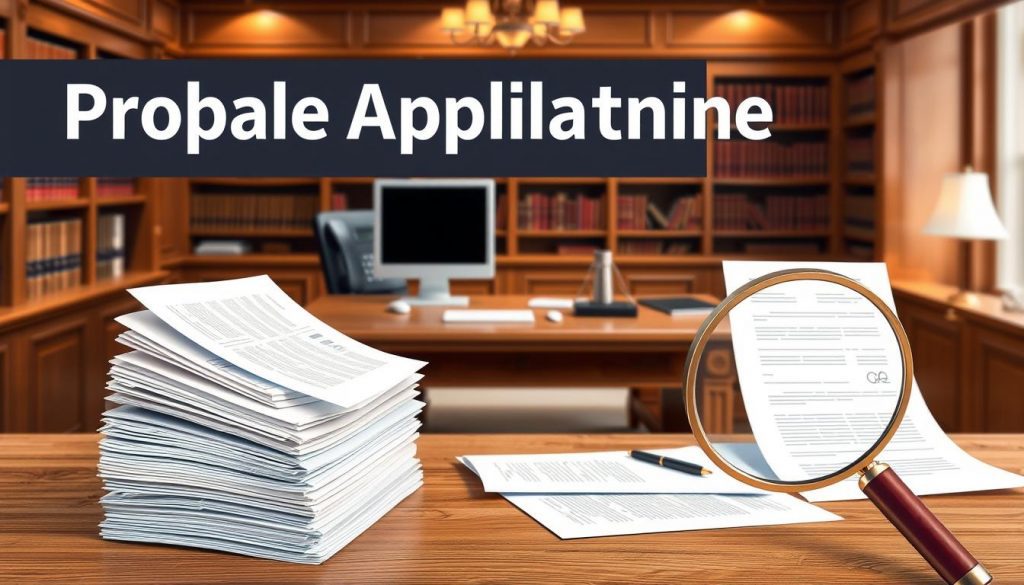Dealing with the estate of a loved one can be a challenging and emotional experience. One of the key concerns is often the probate duration, as it directly impacts the inheritance process timeline. We understand that navigating this process can be daunting, which is why we’re here to guide you through what to expect.
In England and Wales, the probate process typically takes between 6 to 12 months, although it can vary depending on several factors. Even for relatively simple estates, it usually takes at least six months to complete probate. We will explore the factors that influence this timeline and provide you with a clearer understanding of what to anticipate during this period.
Key Takeaways
- The probate process in England and Wales generally takes 6 to 12 months.
- Simple estates typically take at least six months to complete probate.
- Several factors can influence the probate duration.
- Understanding the inheritance process timeline is crucial for estate administration.
- We are here to guide you through the probate process and provide clarity on what to expect.
Understanding Probate in England & Wales
The probate process in England and Wales is designed to ensure that the deceased’s assets are distributed according to their will or the rules of intestacy. This process is crucial for managing the estate effectively and ensuring that the wishes of the deceased are carried out.
What is Probate?
Probate broadly means ‘getting official permission to carry out the wishes in the will.’ It is more commonly used to describe the process of administering someone’s estate. When a person dies, their estate, which includes their assets, such as property, money, and possessions, must be managed and distributed. Probate is the legal process that enables the estate’s representatives to access the deceased’s assets and distribute them according to their will or the law if there is no will.
Why is Probate Necessary?
Probate is necessary for several reasons:
- It provides legal authority to the executors or administrators of the estate to manage and distribute the assets.
- It ensures that the deceased’s wishes, as stated in their will, are carried out.
- If there is no will, probate ensures that the estate is distributed according to the rules of intestacy.
- It helps in resolving any disputes or claims against the estate.
To understand if probate has been granted, you can refer to resources like this guide, which provides detailed information on the process.
In summary, probate is a critical process that ensures the orderly distribution of a deceased person’s estate. Understanding its significance and the steps involved can help in managing expectations during the probate processing period and the overall estate administration time frame.
Average Timeline for Probate
Understanding the average timeline for probate is crucial for executors and beneficiaries alike, as it helps manage expectations during a difficult time. The probate process in England and Wales can be complex, involving various legal and administrative tasks.
Typical Probate Duration
The typical duration for probate is between 6 to 12 months. This timeframe allows for the valuation of the estate, the settlement of debts, and the distribution of assets according to the will or the laws of intestacy. However, this is only an average, and actual probate times can vary.
Several factors can influence the length of probate. For instance, issues with the will, such as disputes over its validity or ambiguities in its wording, can cause delays. Additionally, delays from third parties, like banks or other financial institutions, can slow down the process.
Factors Affecting Probate Times
Factors affecting probate times can be diverse. Disputes among heirs or beneficiaries can significantly prolong the probate process. Other factors include the complexity of the estate, with larger or more complex estates typically taking longer to administer.
It’s also worth noting that the probate process can be affected by external factors, such as the efficiency of the probate registry and the availability of HM Courts & Tribunals Service appointments. For more detailed information on the probate process, you can visit Unbiased.co.uk, which provides comprehensive guidance on the subject.
To manage expectations, it’s essential for executors and beneficiaries to understand these potential delays and plan accordingly. By doing so, they can navigate the probate process more effectively, even when faced with challenges.
Types of Probate Applications
The type of probate application needed can significantly impact the timeline of the inheritance process. In England and Wales, the nature of the application depends largely on whether the deceased left a will and the complexity of their estate.
Grant of Probate vs. Letters of Administration
There are two primary types of probate applications: Grant of Probate and Letters of Administration. A Grant of Probate is required when the deceased left a valid will, and it confirms the executor’s authority to administer the estate according to the will’s instructions. On the other hand, Letters of Administration are needed when there is no will, or the will does not appoint an executor, or the appointed executor is unable or unwilling to act.
The distinction between these two applications is crucial because it affects who can manage the estate and how the assets are distributed. For instance, with a Grant of Probate, the executor named in the will takes precedence, whereas with Letters of Administration, the court appoints an administrator, usually a close relative.
Simple vs. Complex Estates
The complexity of the estate is another factor that influences the type of probate application and its processing time. Simple estates typically involve fewer assets, straightforward distributions, and fewer potential disputes among beneficiaries. In contrast, complex estates may include multiple properties, significant assets, business interests, or disputes among beneficiaries, requiring more detailed legal and financial handling.
- Simple Estates:
- Fewer assets to distribute
- Clear instructions in the will
- Fewer potential disputes
- Complex Estates:
- Multiple properties or significant assets
- Business interests or foreign assets
- Potential disputes among beneficiaries
Understanding whether your situation involves a simple or complex estate can help you anticipate the probate application’s complexity and timeline. It’s also worth noting that the initial application type can sometimes be adjusted as the process unfolds and more information becomes available.
“The probate process can be daunting, but understanding the type of application required is the first step towards a smooth and efficient distribution of the estate.”
By recognizing the differences between Grant of Probate and Letters of Administration, as well as the implications of simple versus complex estates, individuals can better navigate the probate system and manage their expectations regarding the timeline.
Steps in the Probate Process
The probate process involves several crucial steps that executors must follow to ensure the estate is administered correctly. Understanding these steps can help executors navigate this complex process more effectively.
Initial Application
The first step in the probate process is the initial application, which involves registering the death and applying for the grant of probate or letters of administration. Executors must gather necessary documents, including the will, death certificate, and details of the estate’s assets and liabilities.
Key documents required for the initial application include:
- The original will
- Death certificate
- Details of the estate’s assets and liabilities
- Information about the beneficiaries
Issuing the Grant
Once the initial application is submitted, the next step is waiting for the grant of probate to be issued. This can take several weeks to a few months, depending on the complexity of the estate and the workload of the probate registry.
The timeline for issuing the grant can vary, but typically it takes around 6-8 weeks. During this period, executors should be prepared to respond to any queries from the probate registry.
| Step | Timeline | Responsibility |
|---|---|---|
| Initial Application | 1-2 weeks | Executors |
| Issuing the Grant | 6-8 weeks | Probate Registry |
| Distributing the Estate | Several months | Executors |
Distributing the Estate
After the grant of probate is issued, executors can begin distributing the estate according to the will or the rules of intestacy. This involves collecting in the assets, paying debts and taxes, and then distributing the remaining assets to the beneficiaries.

The distribution process can be complex and time-consuming, requiring careful attention to detail to ensure that all legal obligations are met and that beneficiaries receive their inheritances correctly.
Common Delays in Probate
Understanding the common delays in probate can help manage expectations and streamline the process. While probate is a necessary step in managing a deceased person’s estate, it’s not always straightforward.
Delays Due to Missing Documentation
One of the most common causes of delay in probate is missing or incomplete documentation. Ensuring that all necessary documents are in order can significantly reduce the probate duration.
- Ensure all original documents are available, including the will and any codicils.
- Verify the deceased’s identity and residency documents.
- Gather all relevant financial statements and asset records.
Missing documentation can lead to significant delays, as the probate registry will need to verify all information. By having everything in order, you can help prevent unnecessary hold-ups.
| Document Type | Importance | Action Required |
|---|---|---|
| Original Will | High | Locate and verify |
| Financial Statements | High | Gather all statements |
| Asset Records | Medium | Compile records of assets |
Legal Disputes Among Heirs
Legal disputes among heirs can significantly prolong the executor duties duration. These disputes can arise from various issues, including the interpretation of the will or the distribution of assets.
Common areas of dispute include:
- Interpretation of the will’s instructions.
- Distribution of specific assets or bequests.
- Allegations of undue influence or coercion.
Resolving these disputes as quickly as possible is crucial to minimizing delays. Mediation can be a helpful tool in resolving disputes without resorting to lengthy court battles.
By understanding these common delays and taking proactive steps, you can help ensure a smoother probate process. Ensuring accurate information and seeking professional help when needed can mitigate these delays and keep the probate duration as short as possible.
Using a Solicitor for Probate
Engaging a solicitor for probate matters is a decision that can significantly impact the efficiency of the estate administration process. When dealing with the probate application timeline and inheritance process timeline, having professional guidance can be invaluable.
Advantages of Professional Help
Using a solicitor can help streamline the probate process, reducing the risk of errors and delays. Some key benefits include:
- Expertise in Legal Requirements: Solicitors are well-versed in the legal requirements for probate, ensuring that all necessary documentation is correctly prepared and submitted.
- Efficient Estate Administration: With their experience, solicitors can efficiently manage the estate administration process, including asset valuation, debt settlement, and distribution according to the will or intestacy rules.
- Dispute Resolution: In cases where disputes arise among beneficiaries or other parties, a solicitor can provide guidance and representation to resolve these issues.
By leveraging their expertise, solicitors can help executors and administrators navigate the complexities of probate, potentially reducing the overall probate application timeline.
Costs Involved
The costs involved in hiring a solicitor for probate can vary depending on several factors, including the complexity of the estate and the solicitor’s fee structure. Here is a general breakdown of the costs:
| Service | Typical Cost Range |
|---|---|
| Initial Consultation | £150 – £300 |
| Probate Application | £500 – £2,000 |
| Estate Administration | 1% – 3% of estate value |
It’s essential to discuss and agree upon the fee structure with your solicitor at the outset to understand the total costs involved and how they will be deducted from the estate.

By understanding the advantages and costs associated with using a solicitor for probate, individuals can make informed decisions about seeking professional help to manage the estate administration process efficiently.
DIY Probate: Is it Feasible?
Executors often wonder if they can manage probate independently, without the aid of a solicitor. While it’s possible to handle probate without professional help, it can be challenging, especially for complex estates.
The decision to undertake DIY probate depends on several factors, including the size and complexity of the estate, the executor’s level of expertise, and the amount of time available to devote to the process.
Pros and Cons of Self-managing Probate
Self-managing probate has its advantages and disadvantages. On the positive side, it can save on legal fees, which can be a significant portion of the estate’s expenses.
- Cost savings: By handling the probate process personally, executors can avoid solicitor fees.
- Control: Executors have full control over the process and timeline.
- Learning experience: Managing probate can be a valuable learning experience for those involved.
However, there are also potential downsides to consider:
- Complexity: Probate can be legally complex, and mistakes can be costly.
- Time-consuming: Executors must be prepared to spend a significant amount of time on the process.
- Emotional strain: Handling probate can add to the emotional burden on executors, especially during a period of grief.
Resources for DIY Probate
For those who decide to proceed with DIY probate, there are resources available to help navigate the process.
Government websites and probate registries provide essential information and forms. Additionally, online guides and templates can assist with the paperwork and procedural aspects.
It’s also worth considering that while you might start the probate process on your own, you can still seek professional advice if you encounter difficulties or if the estate is more complex than anticipated.
In conclusion, while DIY probate is feasible for some, it’s crucial to carefully weigh the pros and cons and consider your own capabilities and the specific circumstances of the estate.
Impact of the COVID-19 Pandemic on Probate
The COVID-19 pandemic has significantly disrupted the probate process, causing unforeseen delays and complications. As we navigate through these challenges, it’s essential to understand the changes that occurred during the lockdowns and the current status of probate services.
Changes to the Probate Process During Lockdowns
During the lockdowns, the probate process faced significant disruptions. The HM Courts & Tribunals Service (HMCTS) had to adapt to new ways of working, which initially led to a backlog of cases. According to a report by the Law Society, the pandemic resulted in a substantial increase in probate application times.
“The COVID-19 pandemic has had a profound impact on the administration of justice, including the probate process. Courts and tribunals have had to innovate and adapt to continue functioning during this challenging period.” –
The lockdowns forced probate registries to close or operate with reduced staff, leading to delays in the processing of probate applications. The situation was further complicated by the need for social distancing, which affected the ability of solicitors to gather necessary documentation and interact with clients.
Current Status of Probate Services
As restrictions have eased, probate services have gradually returned to a more normal operating capacity. However, the legacy of the pandemic continues to affect probate duration and application timelines. Executors and beneficiaries need to be aware of the current status and plan accordingly.
| Service | Pre-Pandemic Status | Current Status |
|---|---|---|
| Probate Application Processing | Typically 6-12 weeks | Currently 12-20 weeks |
| Grant of Probate Issuance | Usually within 3 months | Now taking up to 6 months |
Understanding these changes and the current status of probate services can help manage expectations and facilitate a smoother probate process. It’s crucial for executors to stay informed and seek professional advice when needed to navigate these challenges effectively.
Managing Expectations During Probate
Managing expectations during probate involves clear communication and a grasp of legal obligations. As executors navigate the complex probate process, they must balance the needs and expectations of various beneficiaries while ensuring compliance with legal requirements.
Communicating with Family Members
Effective communication with family members is crucial during probate. Executors should:
- Provide regular updates on the probate process
- Clearly explain the timeline and any delays
- Discuss the distribution of assets and any tax implications
As one legal expert notes, “Transparency is key to managing expectations and reducing potential conflicts among beneficiaries.”
“Executors who keep beneficiaries informed throughout the probate process tend to experience fewer disputes and a smoother overall process.”
Understanding Legal Obligations
Executors must understand their legal obligations during probate, including:
- Filing the necessary paperwork with the probate registry
- Valuing the estate accurately
- Paying any debts and taxes owed by the estate
| Legal Obligation | Description | Timeline |
|---|---|---|
| Filing Paperwork | Submitting the initial probate application | Within 6 months of death |
| Valuing the Estate | Accurately assessing the estate’s value | Typically within 3-6 months |
| Paying Debts/Taxes | Settling outstanding debts and taxes | Before distributing assets |
By understanding these legal obligations and maintaining open communication with family members, executors can manage expectations effectively and ensure a smoother probate process.
Conclusion: Navigating the Probate Process
Navigating the probate process requires patience, understanding, and often professional guidance. As we’ve discussed, the probate processing period can vary significantly, typically ranging from 6 to 12 months in England & Wales.
Efficiency in Probate
To ensure a smooth probate application timeline, it’s crucial to understand the factors that can affect the duration, such as the complexity of the estate and the presence of legal disputes among heirs.
Seeking Professional Help
Executors should be aware of when to seek professional advice to avoid delays and ensure that the estate is distributed according to the deceased’s wishes. Using a solicitor for probate can provide valuable expertise, especially in complex cases.
By understanding the probate process and knowing when to seek help, executors can manage expectations and navigate the system more efficiently.


